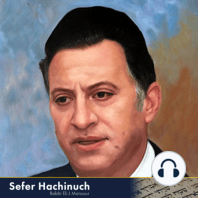20 min listen
Misvot #310-311: Refraining From Work on Rosh Hashanah
FromSefer Hachinuch
ratings:
Length:
20 minutes
Released:
Nov 7, 2022
Format:
Podcast episode
Description
The Torah in Parashat Emor (Vayikra 23:24) introduces both an affirmative command to observe the day of Rosh Hashanah as a sacred day, refraining from Melacha (constructive work), and a prohibition against performing Melacha on this day. Thus, as with other holidays, performing Melacha on Rosh Hashanah is forbidden by force of both a Misvat Aseh (affirmative command) and a Misvat Lo Ta’aseh (prohibition). The Sefer Ha’hinuch lists these commands as the 310 th and 311 th Misvot of the Torah. In discussing the observance of Rosh Hashanah, the Sefer Ha’hinuch writes that it is an expression of Hashem’s boundless kindness that He judges mankind on a yearly basis. If He would not make an annual accounting of people’s conduct, their misdeeds would accumulate and become so numerous that severe punishment would be necessary to atone for them. G-d makes an accounting each year so we repent and then embark on a new, fresh beginning. And if we are deserving of punishment, this would be for relatively few violations, such that our punishment will not be especially severe. If Hashem would not judge us each year, the Sefer Ha’hinuch writes, mankind’s sins could accumulate to the point where the world would deserve annihilation. Hence, Rosh Hashanah is necessary for sustaining the world and keeping it in existence. The Sefer Ha’hinuch writes that for this reason, as the fate of the world is at stake, we are to sense a degree of fear and dread on Rosh Hashanah, more so than during the rest of the year. The Torah describes Rosh Hashanah as a day of “Zichron Teru’a,” when a “Teru’a” sound is produced from the Shofar. The “Teru’a” is a “broken” sound – a series of short, rapid blasts, symbolizing the weeping of a broken spirit. On Rosh Hashanah, we are to introspect and “break” our evil inclination, regretting our wrongdoing and committing to make a fresh start. The Sefer Ha’hinuch references in this context the Gemara’s comment that the festive Hallel service is not recited on Rosh Hashanah because the “books of life and death are open.” This is a time of fear, and thus Hallel is not appropriate. The Gemara teaches that one can escape evil decrees on Rosh Hashanah in four ways: by giving charity; crying out to Hashem in prayer; changing one’s name, symbolizing that he has repented and become a different person, such that the decree does not apply to him; and, most importantly, changing one’s conduct. The Sefer Ha’hinuch cites the Gemara’s comment that “three books are opened on Rosh Hashanah – one of the completely righteous, one of the completely evil, and one of those in the middle.” Those who are righteous are immediately inscribed for life; the wicked are inscribed for death; and the judgment of those in the middle is held in abeyance until Yom Kippur. The Sefer Ha’hinuch explains that the Gemara refers here to those who are entirely righteous, without any sin, and those who are entirely wicked, without any virtue. These groups are sentenced on Rosh Hashanah to life and death, respectively. Everyone else is held in abeyance until Yom Kippur, regardless of whether their merits exceed their sins, or if their sins exceed their merits. (The Sefer Ha’hinuch cites proof to this reading from a different version of this teaching cited by the Gemara in the name of Bet Shammai.) On the basis of this explanation, the Sefer Ha’hinuch adds, a “great difficulty” is resolved. The commentators explain that at first glance, it seems difficult to accept that all the righteous are inscribed for life, and all the wicked are inscribed to death. After all, we see many righteous people who pass away, and many wicked people who survive and prosper. This question is resolved by the Sefer Ha’hinuch’s explanation, that the Gemara refers to those who are perfectly righteous and those who are exclusively wicked. Everyone else has both merits and demerits, and G-d, in His infinite wisdom and pristine justice, determines who among these is worthy of living and who is not
Released:
Nov 7, 2022
Format:
Podcast episode
Titles in the series (100)
Misva #8: Leaving Over Meat of the Korban Pesach: Daily Sefer Hachinuch - Brought to you by itorah.com by Sefer Hachinuch
